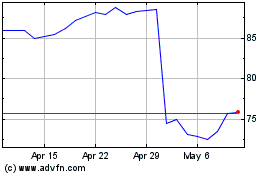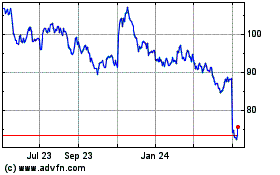By Tatyana Shumsky
A social media kerfuffle can bruise a company's reputation, but
these incidents rarely leave a red mark on the bottom line.
Video of a passenger being dragged off a United Airlines flight
is fanning the latest outrage on social media. Earlier this month,
PepsiCo Inc. pulled an advertisement that was panned as culturally
insensitive. Starbucks Corp. faced a backlash in January when it
said it would hire 10,000 refugees globally.
These incidents often grab consumer attention, but such
controversies rarely translate into a material impact on sales or
earnings in the absence of serious product issues. When money is
paid -- as in the case of United Continental Holdings Inc.
refunding the ticket costs to all customers on the 70-seat flight
-- the effect is barely a rounding error on the quarterly
results.
"There's no way that [refunding] one flight would be material to
United's total financial condition," said Trent Gazzaway, national
managing partner of professional standards at accounting firm Grant
Thornton.
There is also scarce executive disclosure of these events in
financial filings because they are not considered material, or
likely to change a reasonable shareholder's investment
decision.
A review of filings by companies including United Continental,
Pepsi and Starbucks showed they so far haven't disclosed the social
media incidents to the Securities and Exchange Commission.
"Social media interest by itself may not be material enough to
warrant a disclosure in the financial statements," said Olga
Usvyatsky, vice president of research and CPA at Audit Analytics,
an audit, regulatory and disclosure research firm.
Companies typically make such disclosures, like flagging the
effect of a severe storm or a cyberbreach of corporate computer
systems, in quarterly reports or a so-called Form 8-K, used to
notify investors of a current event that could be material to the
company or affect the stock price.
A social media uproar should prompt executives to assess the
potential for a material impact from a corporate-disclosure
perspective. "This is a massive area of judgment for CFOs," Mr.
Gazzaway said.
When determining materiality, executives weigh quantitative
factors, like whether income or sales are likely to fall below a
company-determined threshold, as well as qualitative factors, which
are less clearly defined.
A United Airlines spokeswoman declined to comment on questions
about the materiality of the incident. The company is due to report
its first-quarter earnings on Monday after markets close. In
January, it posted fourth-quarter earnings of $397 million on
revenue of $9.05 billion.
United Continental stock fell last Monday, the day the video
came out, though analysts attributed the move to mixed operational
data released that morning. The stock ended the week down 2.6%, and
the Dow Jones U.S. airlines index fell 0.9%.
"Historically, incidents like this are one-off in nature and
rarely pose lasting or significant financial headwinds for major
transportation companies," analysts at Citigroup said in a note to
clients.
Still, consumer-facing companies, which are particularly
vulnerable to social controversies, should outline such risks and
response strategies in financial filings, said Nell Minow, vice
chair of corporate governance consulting firm ValueEdge
Advisors.
"They need to let their investors know that they're prepared to
deal with it promptly and effectively to prevent a material
deterioration of the stock price," Ms. Minow said. "It's very much
like cyberattacks -- it's a relatively recent phenomenon that every
company has to be prepared to deal with."
PepsiCo likely paid as much as $30 million in talent and
production costs of the ad it scrapped in response to the social
media outcry, said Gene Grabowski, a crisis management specialist
at communications firm kglobal. Pepsi's most recent quarterly
earnings totaled $1.4 billion. Pepsi's most recent quarterly
earnings totaled $1.4 billion.
"For Pepsi, in this situation, there might be some short-term
impact, but long-term, it's doubtful," Mr. Grabowski said, adding
that the company has built up strong consumer loyalty over its
history. "Pepsi is an old brand, and a lot of consumers may not
care about this."
Starbucks in January sparked social media calls for a boycott
after Chairman and Chief Executive Howard Schultz said the
coffee-store chain would hire 10,000 refugees globally. Some
customers criticized the announcement on Twitter, with the hashtag
#BoycottStarbucks trending on the social-media network for several
days.
Mr. Schultz addressed the issue at the company's annual
shareholder meeting in March.
"I can unequivocally tell you, and we all know this from the
research we've done, that there is zero, absolutely no evidence
whatsoever that there is any dilution in the integrity of the
Starbucks brand, reputation or our core business as a result of
being compassionate," Mr. Schultz said.
Write to Tatyana Shumsky at tatyana.shumsky@wsj.com
(END) Dow Jones Newswires
April 15, 2017 06:14 ET (10:14 GMT)
Copyright (c) 2017 Dow Jones & Company, Inc.
Starbucks (NASDAQ:SBUX)
Historical Stock Chart
From Mar 2024 to Apr 2024

Starbucks (NASDAQ:SBUX)
Historical Stock Chart
From Apr 2023 to Apr 2024
